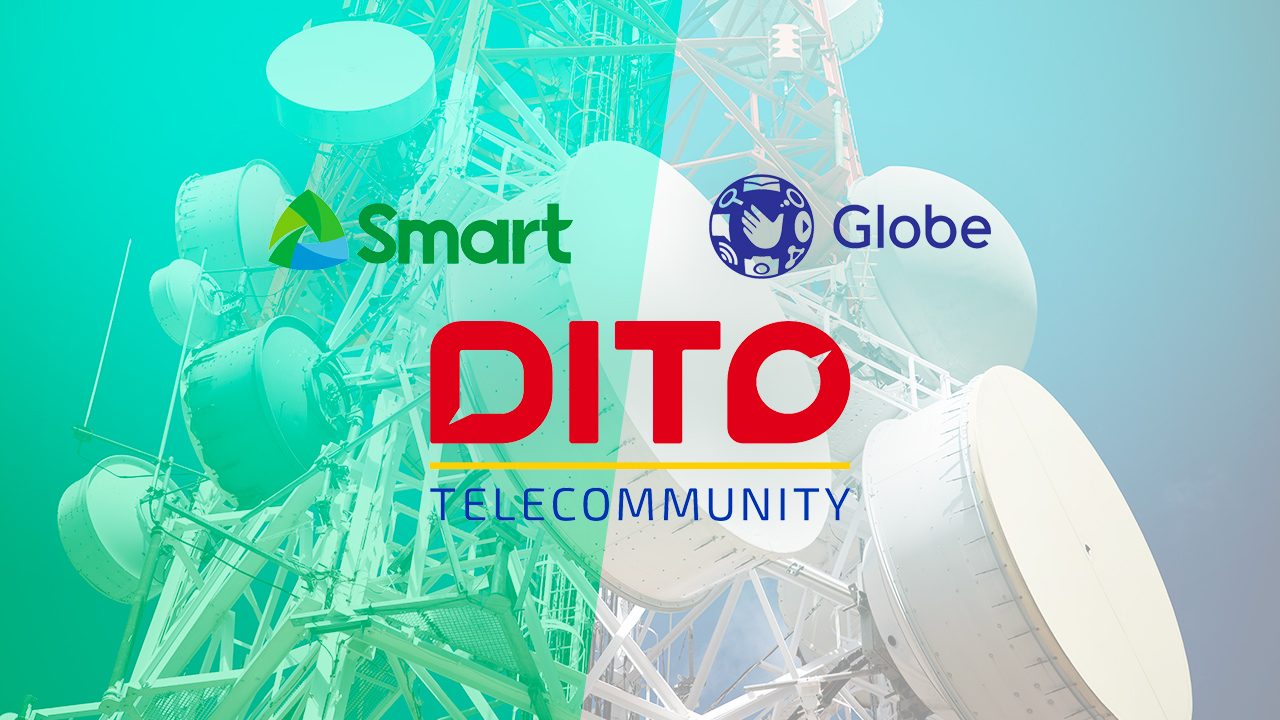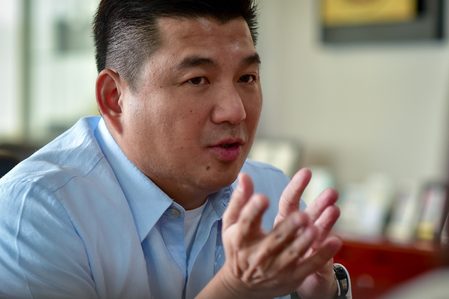SUMMARY
This is AI generated summarization, which may have errors. For context, always refer to the full article.

AT A GLANCE:
- Two years since its commercial rollout, Dito has outperformed telco legacy giants Globe and Smart in several categories, including upload speed, signal availability, and overall experience.
- While Dito has started to disrupt the Philippines’ telco space, auditors have flagged its massive borrowings threatening its financial viability.
- Dito’s ties with China will continue to be an issue, especially during the Marcos administration and given its evolving relationship with Beijing.
MANILA, Philippines – When businessman Dennis Uy and China Telecom placed their bid to be the Philippines’ third “major” telecommunications player back on November 7, 2018, their representatives made sure to create a spectacle.
Their bidding documents were secured with blue ribbons and were packed in rose gold and black suitcases. The other bidders who showed up had theirs in sad balikbayan boxes. Their battery of lawyers and officials comprised of Filipino and Chinese nationals filled one side of the room.
It was quite obvious that Uy and China Telecom would win the coveted frequencies. After all, they were the only ones who were qualified.

Local players PT&T and Chavit Singson’s Sear Telecom did not stand a chance, as they failed to meet basic bidding requirements. Meanwhile, representatives of Mel Velarde’s NOW Telecom showed up, but eventually backed out just before bidding commenced.
Foreign companies like Korea Telecom, Telenor, and Mobiltel were expected to join the anticipated showdown, but were no-shows too. It was heavily speculated that they were spooked by Uy – former president Rodrigo Duterte’s campaign donor – being backed by Beijing’s state telecommunications company.
Uy and China Telecom’s consortium (eventually renamed Dito Telecom) used the congressional franchise of a little-known company called Mindanao Islamic Telephone (Mislatel) to make their bid valid. The terms of reference required companies to team up with a company that held a franchise and had a proven track record of operations. Mislatel held a franchise and was supposed to operate in Maguindanao way back in 2001, but held off commercial operations supposedly due to security concerns in the area.
Adding to the curious events surrounding Dito’s win was Duterte’s decision, just days after bidding ended, to replace Eliseo Rio, who at that time, led the Department of Information and Communications Technology.
The entry of a third telco player has long been anticipated by Filipinos who have been unhappy with the internet services offered by Globe and Smart.
But even before Dito could operate and compete with the telco duopoly, its unsurprising win without a clear rival, as well as its glaring political ties, continue to cast doubt over its capabilities.
Numbers, however, would reveal that it has started to disrupt the telco space that benefited consumers.
To an extent, Dito has found some success just over two years since its commercial operations. But auditors are keeping a close eye on whether the company can outpace its debt-driven growth.
Business circles are also watching Uy’s next business move, as he sells off assets and has not received the same red carpet treatment as during the Duterte administration.
Dito catching up
Since its commercial rollout in 2021, Dito has secured 14.9 million subscribers. This is, however, just 8.9% of the over 168 million total SIM cards nationwide. Globe dominates with 86.7 million (51.6%), while Smart has 66.3 million (39.4%).
While last in terms of market share, Dito has managed to keep up and even outperform competitors in some aspects of services. According to analytics company OpenSignal, Dito is better than Globe and Smart in terms of upload speed experience, availability, and consistent quality of service.
"It is Dito, not Globe, that is giving Smart reason for concern in the Download Speed Experience category, despite Smart having won this award outright for the past 12 reports in a row. In the October 2021 report Smart led Dito and Globe (which were tied for first place) by around 10Mbps – fast forward to the April 2023 report and Dito is only 2.6Mbps behind Smart," OpenSignal said in its latest report.
OpenSignal went on to say that Dito's entry has "significantly shifted" the balance of the Philippines' mobile experience.

It took decades for Smart and Globe to achieve such service and coverage, yet Dito was able to do so in two years with just P37.9 billion (around $67 million).
Dito chief administrative officer Adel Tamano offered perspective on the matter, noting that the bigger telco networks had legacy infrastructure to wind down whenever new technology emerged.
"Essentially, we don't have a legacy system. We started with fiber connections. We started with cloud-based services. Cumulatively, all of these technologies will bring down the cost of operations."
The government's common tower policy also helped Dito in its rollout. The measure allowed multiple telco companies to use the same towers instead of building separate infrastructure. This was beneficial for all telcos, but most especially for the new player which had to catch up.
Dito has plenty of room to grow. It must do so not just for profit, it is obliged to do so. Unlike Globe and Smart, Dito must fulfill its commitments it signed off on when it bid for the frequencies.
Financial viability
Korea Telecom and what could have been its local partner, Converge ICT, handed out press releases on bidding day, saying that the conditions imposed for the bid rendered the venture “commercially unviable.”
Meanwhile, Mobiltel cited “uncertainties” that would expose investors to risks. They also had issues with the selection process and foreign ownership restrictions.
So far, Dito is bleeding to the point of auditors questioning its ability to continue as a business.
The independent auditors of Dennis Uy’s Dito CME, the publicly-listed corporate vehicle of Dito, raised concerns about the company’s ability to make enough money to stay afloat for the foreseeable future, given its massive liabilities.
Punongbayan & Araullo Grant Thornton (P&A) underscored Dito CME’s liabilities in 2022, including exceeding its current assets by P196.6 billion, comprehensive losses reaching P25.6 billion, and capital deficiency hitting P27.9 billion, as conditions that indicate the “existence of a material uncertainty that may cast significant doubt on the ability of the Group to continue as a going concern.”
In response to P&A’s concern, the group said that it continues to “heighten its commercial operations through targeted subscriber acquisition and promotional activities aimed at increasing revenue.”
“Also, the Group will continue to efficiently implement its network roll-out plan and cost-saving measures to improve the results of operations,” the audit report said.
Dito CME also intends to do various fundraising activities in 2023, including a follow-on offering to fund telco and digital business funding requirements.
Meanwhile, Dito is relying on bridge loan facilities with Chinese banks as several of its loans have matured. Last May 27, it announced that Bank of China and China Minsheng Banking Corp. Ltd. had extended it a $1.17-billion bridge facility.
“This bridge facility is to be repaid and absorbed via a $3.9-billion project finance long-term facility currently being finalized by DitoTel’s senior management, with target closing within the year,” Dito CME said in a stock exchange filing.
Responding to questions about Dito's financials, Tamano said that they do not expect profits until 2028.
"I think you're not looking at our numbers correctly. In terms of our network, in terms of our data centers, in terms of our offices, our personnel, etc. If you will spend P200 billion in less than three years, do you expect to earn that right away? Of course not. That's why I do have a problem when there are those who put forth the opinion that, oh, Dito is at risk because they're not earning money yet. We knew that from the onset. We're not going to earn money at the start," Tamano emphasized.
"And if you know anything about China, and the Chinese mentality, they do not think in terms of business cycles, they don't think in terms of years. They think in terms of decades and centuries. And so, to be very honest about it, the audit looks only at a snapshot of a year."
Challenges and strategies
Dito chief technology officer Rodolfo Santiago said that by 2027, they expect to have a positive cash flow, or when cash acquired exceeds cash spent. A positive net income is targeted by 2028.
To achieve these, Dito will have to not only outdo competitors, but will have to also overcome image issues and wait out technological limitations.
While its services have caught up with the latest technologies, not all can avail of them. Dito SIMs use VoLTE technology, which allows voice calls over an LTE connection instead of older, legacy voice networks. Older phones that don't use this can't accept Dito SIMs. Even iPhone users can't switch to Dito, at least for now.
This June, Dito is expected to launch its postpaid services. They hope to entice users to avail of "unique" phones from China Telecom, as well as other perks that some users may be willing to spend on.

"We do offer things that other telcos can no longer offer. I'll give you a very specific one: Vanity numbers. We still have a lot of numbers. So if there is a company that wants to have a specific type of number, we still have that," Tamano said.
Growing its market share will also be a challenge, considering that people may limit their SIMs due to the requirements of mandatory registration. A valid ID, a basic document that everyday Filipinos struggle to obtain, is required to register a SIM card.
Dito is aiming to grow its subscriber base from 14.9 million to 20 million, but officials don't have a direct answer if they will be able to hit that target.
"I think it's an industry concern, but I think there's also value in that. People will value their SIMs more because of the steps you had to go through to register one. The industry will have a better view how many active SIMs really are there," Tamano said.
Dito is part of Uy's embattled empire. From a buying spree fueled by debt during the Duterte administration, Uy is currently selling assets and has, so far, avoided a default domino. Dito, which, on several occasions, has been accused of being a spying risk, is the only one with a clear lifeline from Chinese lenders. – Rappler.com
Add a comment
How does this make you feel?

![[Vantage Point] Dennis Uy and Lady Luck](https://www.rappler.com/tachyon/2023/11/TL-dennis-uy-lady-luck-November-28-2023.jpg?resize=257%2C257&crop_strategy=attention)

![[Vantage Point] Quo vadis, Dennis?](https://www.rappler.com/tachyon/2022/06/quo-vadis-dennis-uy-June-15-2022.jpg?resize=257%2C257&crop_strategy=attention)

There are no comments yet. Add your comment to start the conversation.